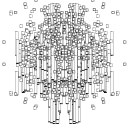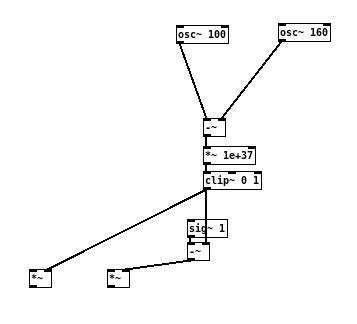-
 solipp
posted in news • read more
solipp
posted in news • read more@jamcultur this would be easy to fix, but pd currently has no method to get the zoom factor of a patch window. I filed a pull request to add this to [pdcontrol]; https://github.com/pure-data/pure-data/pull/2846 let's see if it makes it into the next release.
Here is a larger version of pp.xypad that you can use: xypad-large.zip
-
 solipp
posted in news • read more
solipp
posted in news • read moreVersion 0.80 is now available.
-
3 new objects: [pp.distort~] and [pp.dystort~] for distortion and saturation effects, and [pp.xypad], which is a 2D controller that allows you to record and play back moves.
-
[pp.fft-partconv~.s] runs cpu-heavy partition convolution in a subprocess using [pd~]
-
A new example shows how to use [pp.grainer~] as a polyphonic granular synth.
-
New control rate outlets for [pp.lfnoise~], [pp.shiftlfo~] and [pp.adsr~].
-
[pp.vcfilter~] now has an option for an audio rate notch filter.
-
[pp.sfplayer~]: new option to write recorded audio to file
-
many bugfixes etc.
Happy patching!
-
-
 solipp
posted in technical issues • read more
solipp
posted in technical issues • read moreI'm trying to extract level crossings between 2 signals, [...] and use that to switch signals.
the patch i posted above does this. However, it doesn't generate a trigger (one sample impulses?) from each crossing...
I do think it's very similar to what [max~ ] is doing, unless I'm misunderstanding?
mh i don't know. It depends on what you do with [max~], which is not clear to me.
For my purposes, I'll need a stream of triggers to gate a trigger (vs gate) stream that I'm going to gate with another process so that trigger signals only pass when the other process opens to gate the level crossing triggers. The problem is, then I need a flipflop/toggle...
This works, for reference:
...looks like you found a solution(?) I'm wondering if you even need to generate/process a stream of audio rate triggers to achieve your goals. I know supercollider uses audio rate triggers, but in pd it is a bit tricky to work with this concept.
-
 solipp
posted in technical issues • read more
solipp
posted in technical issues • read more
like this, maybe?
Edit: multiplication with smaller values should also be sufficient: [*~ 1e+12]
-
 solipp
posted in technical issues • read more
solipp
posted in technical issues • read morei missed this somehow. It is fixed now in the github repo and will be included in the next deken upload.
-
 solipp
posted in news • read more
solipp
posted in news • read more@jyg said:
just out of curiosity : why did you move to "deprecated" some objects (for example : pp.rev~) ?
because I am not planning to develop them any further (i don't use them anymore) and there are better alternatives, such as pp.phiverb~. I'm keeping them for anyone who wants to use them, Just copy from the deprecated folder.
There is a lot of stuff I'd like to change in this library, particularly the names of some of the objects. "pp.phiverb~" "pp.butterkreuz3~" etc., just horrible! plain stupid. I don't know who came up with this. So whenever i make a fundamental change in the future, i will keep a copy of the old stuff in the deprecated folder. However, the worst is the name of the library itself; "Audiolab" ... I hate it!
Too late to change that now i suppose
-
-
 solipp
posted in news • read more
solipp
posted in news • read more@jyg said:
Did you re-upload the latest audiolab 0.71.1 ?
yes, i re-uploaded, thanks to this comment from IOhannes in the list:
what i can say is, that the "audiolab" package includes both a "LICENSE"
file and a "License/" directory.
this is not a problem on case-sensitive filesystems (like ext2/3/4 on
linux), but it cannot work on case-insensitive filesystems (like FAT32,
NTFS or HFS+).I was not aware of this and it was on my end to fix it, so thank you for bringing it up in the list!
Edit: the version number is the same, 0.71.1 because nothing has changed in the files except that LICENCE is now called LICENSE.txt.
If anyone else had issues with the install from deken, please try again.Thanks again for helping to clear this up!
-
 solipp
posted in news • read more
solipp
posted in news • read more@jyg hm so i just checked if i missed something and if it is actually common practice to share files on deken with group and global write permissions. But that doesn't seem to be the case, here is a part of
zipinfooutput of else-v1.0-0_rc14 for example:

Is installing else causing trouble for you?
Could it be that you are having this problems because you are logged in as admin, not as user or you are trying to unpack these files to a protected folder or something like this?If it helps i can re-upload the files with extra write permissions.
